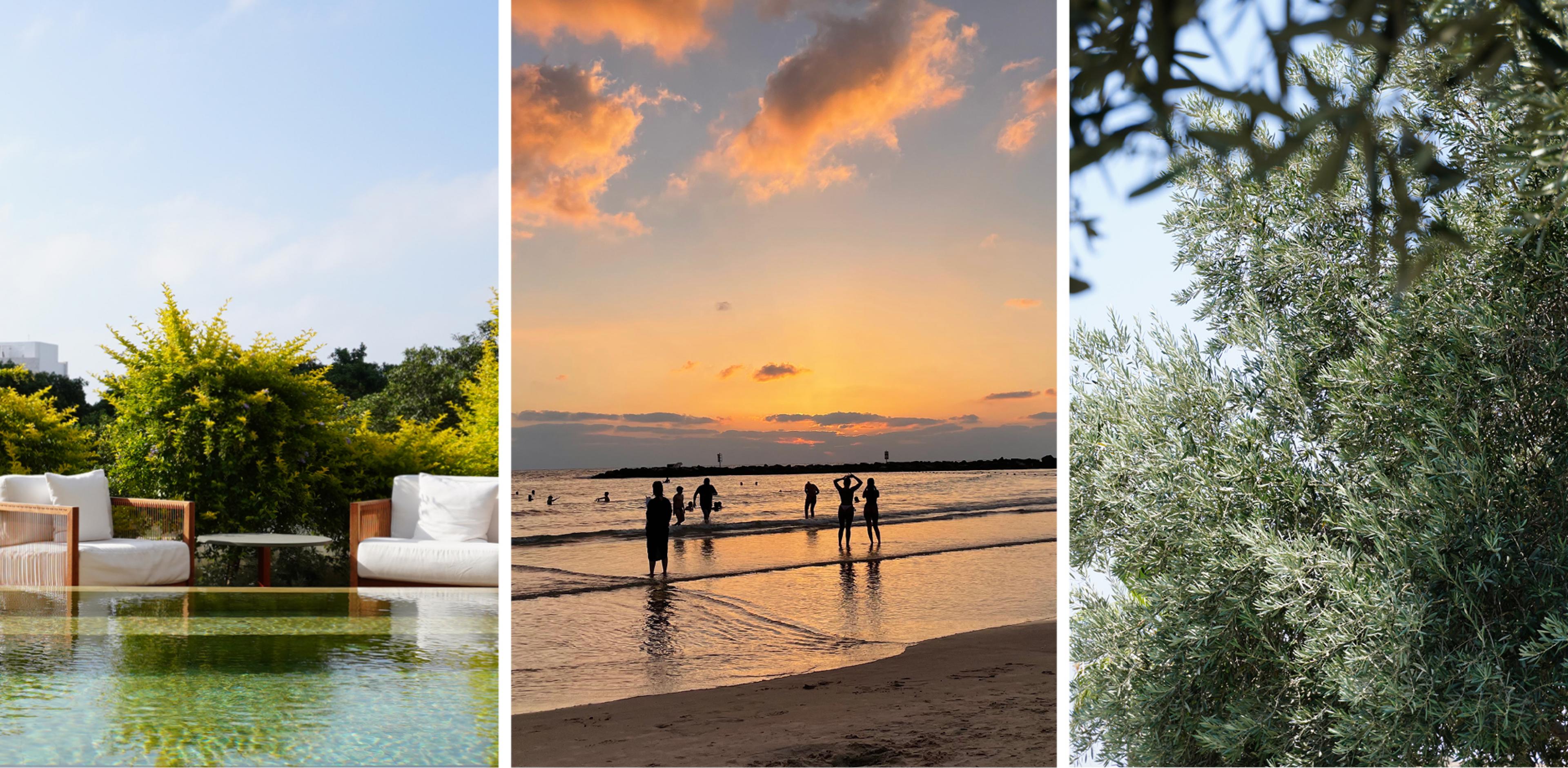Join/
Just Back From
Just Back From… Israel
Dusk was falling on Jaffa, the oldest neighborhood in Tel Aviv, when Israeli chef Nir Zook met up with our group of six. The handsome and charismatic celebrity chef, who at the age of 42 already has restaurants, books and a TV show under his belt, has been called “one of the chefs defining modern food in Israel.”
Dressed in his chef whites, he was grasping a handful of thin branches he had foraged earlier that day. “Here, rub these between your fingers and taste,” he said, picking off a few leaves. “This shrub is indigenous to Israel. The leaves are tangy, like lemon. They’re great with fish.” With his small dog trailing behind him, he led us down the cobblestoned streets to his home and welcomed us into his kitchen for dinner. The room had an open layout with a vaulted ceiling and glass doors that opened onto the stone alley below. Next to a small stove packed with simmering pots, a long table had been set, candles flickering. Over the next few hours, Zook stood at the stove chatting with us, stirring, slicing and meticulously plating, while we feasted on dish after dish. He interspersed stories from his childhood (he grew up in a small village and got his first restaurant kitchen job at the age of 12) with explanations of his cooking technique, showing us how he made a stock from shrimp shells and aromatics, then used it to blanch vegetables for extra flavor. Everything was homemade, down to the challah bread, served with coarse sea salt. The courses kept coming: shrimp with sautéed spinach and leeks, a delicate artichoke soup, roasted beets, fresh fish carpaccio, risotto made with farro and a sprinkling of almonds. It was a quintessential Israeli experience, full of openness, generosity and abundance, and the perfect way to kick off a week there.
I went to Israel because I was drawn to its history, but left enchanted by its modernity and vitality. There is an energy that is palpable. I noticed it the first day, when, thanks to jetlag, I woke at sunrise and got my first taste of Tel Aviv people-watching. My room at the Dan Tel Aviv had huge plate-glass windows overlooking the beach. I cracked them open and felt the chilly morning air, then noticed how much was happening below me. I could count no fewer than a dozen surfers catching waves in the area marked “dangerous, no swimming.” Next to one of the warning signs, a woman who looked to be in her seventies was standing waist-deep letting the strong waves crash against her, undeterred by risk or brisk temperature. Live like that, I thought to myself. You can feel the energy throughout Tel Aviv, from the packed al fresco restaurants along Rothschild Boulevard to the bikers by the beach to the overflowing bars in the evenings. At Jerusalem hot spot Machneyuda, the most coveted restaurant reservation in town, music is blasting, food is theater, and the waiters take breaks to dance on the bar.
In Jerusalem, of course, the energy is also deeply spiritual. When I travel, I try to engineer my visit to see the sites while encountering as few tourists as possible (i.e. visiting places during the off season, touring sites early in the morning). In Jerusalem, I was surprised to find that the tourists actually added to my experience: it was evident that the holy city made a profound emotional impact on everyone present. I was particularly transfixed by the way people stretch out their arms to lay their palms and foreheads on the Western Wall, holding them there for as long as they can, pressing deeply into the stone. My favorite site was the Basilica of the Agony on Mount of Olives, an intimate Byzantine church with exquisite cobalt blue and gold mosaic ceilings that shimmer in the soft light. (It was so beautiful, I cried, at which point a random tourist came up and hugged me. Only in Jerusalem!)
What’s fun about Israel is how easily this kind of historic and cultural exploration can be combined with outdoor adventure. The country is small with a wide geographical range: mountain and beach, lush farmland and desert. Splitting our time mostly between Tel Aviv and Jerusalem, we had a huge variety of experiences with minimal moving around. For hotels, we based ourselves in Tel Aviv at the Dan and in Jerusalem at the King David. Both are very centrally located–the Dan right on the beach and the King David just outside the gates of the Old City–and are particularly memorable for the views from the rooms and the quality of the food. (The breakfast buffet at the King David, in particular, is outstanding, with a juice bar and amazing smoked fish and cheeses.) In Jerusalem, we were able to walk to the main historical and religious sites one day and then do an excursion to the desert the next. We explored the 2,000-year-old mountaintop fortress of Masada and then went swimming in the aqua blue waters of the Dead Sea. In Tel Aviv, our group took a cooking class, did a street art tour, went biking and visited markets to sample street food. The local cuisine is heavily oriented to fresh fruits, vegetables, fish and soft cheeses. The emphasis on small plates makes it easy to share: each meal we savored was communal, delicious and quintessentially Israeli.
Contact Indagare to book a trip to Israel. Our travel specialists can match you with the right hotels, plan great meals and activities and organize behind-the-scenes access.
Plan Your Trip With Us
We only feature hotels that we can vouch for first-hand. At many of them, Indagare members receive special amenities.
Get In Touch


